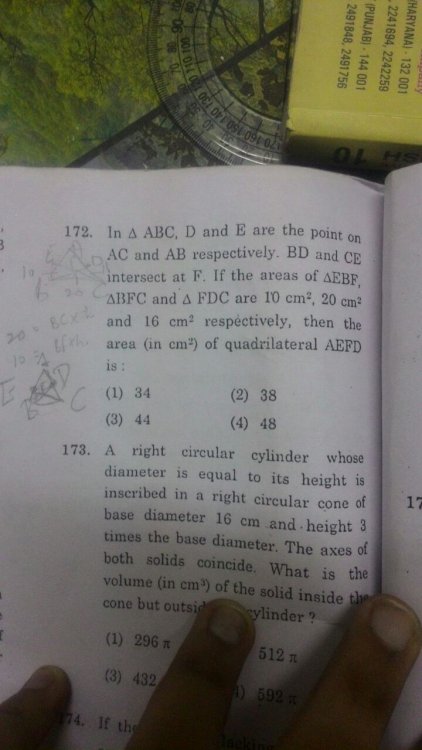Leaderboard
Popular Content
Showing content with the highest reputation on 08/03/17 in all areas
-
4 points
-
Ezekiel 25:17. Well, looky here, something from the OT that's not demanding we all kill or hate each other, go figure...2 points
-
Seeing veins is neither paranormal or psychic. Phlebotomists do it every day. It's also possible your visual system is a bit borked and you're just more sensitive to the near-infrared side of the visual spectrum. Machines like those described at the following link would allow you to run tests to see if this is anything more than a delusion: https://www.cnet.com/news/near-infrared-makes-veins-easier-to-find/ Who knows, though. If you keep using meth, soon we'll be able to see gaps where your teeth used to be, tears where joy used to be, and potentially even graves where life used to be.2 points
-
After a recent update to our forum software, typesetting equations on SFN has changed a little bit. Although we are still using LaTeX, for a variety of reasons, we've elected to shift over from our custom-written LaTeX generator to the excellent MathJax library, which will take your equations from post text and render them in your browser. Much as before, the idea is that in your post, you surround equations with special characters, and MathJax will convert the contained text into an equation for you. There's two types of equation that you can typeset: Inline math is displayed in the flow of a sentence, such as \( y= x^2 \). This example was produced by using the text \( y=x^2 \). Note that we do not support $ signs as most LaTeX users would be familiar with, since this occurs too frequently in text. Display math breaks up a paragraph and can be used for typesetting larger equations such as \[ y = \int f(x) dx. \] The text then picks up afterwards. This example was produced by using the text \[ y = \int f(x) dx \] , which we note is exactly what one would type in a usual LaTeX document. For reference, the old guide is still available and has a number of useful examples for those getting started. Finally, please note that for legacy posts, the old [math] [/math] tags will still continue to work and these will display equations as inline. However it's likely that older posts may look different to the way that they did before.1 point
-
A paper from Jul 2013 'Stable Carbon isotopes of C3 plant resins and ambers record changes in atmospheric oxygen since the Triassic', available for free as a PDF, suggests that O2 levels were much lower than previously thought, and only about 10-15 % concentration in the atmosphere. This seems to go against the commonly held belief that higher O2 levels allowed Dinosaurs to grow to such large sizes. Volcanic activity was much higher in that era, the seas much shallower and CO2 concentration in the atmosphere 5 to 10 times higher than current levels; And, on the face of it, this seems an argument against RUNAWAY global warming, because global temps came down from a level approx. 7 deg higher than current levels, instead of a runaway increase. Is this paper factually wrong ? Is it drawing the wrong conclusions from the findings ? Or am I drawing the wrong conclusions ? Tappert_GCA_2013.pdf1 point
-
I forgot nothing, but you seem to have side stepped my previous statement thus. "Is English your first language? Because as at least two others have noted, your claims/beliefs/philosophical musings, are confusing to say the least". [1] Reputable scientists do not ignore evidence, rather they logically lean towards where the main body/weight of evidence dictates.eg: The anomalous galactic rotations did not suddenly invalidate the whole of our theory/s of gravity, rather a hypothetical DM was envisaged which since has now been supported by evidence.[see the bullet cluster article] [2] Belief is belief: If evidence dictates a certain model like the BB, one can chose to logically claim the BB is the current accepted view/belief of the evolution of the universe/spacetime. [3]The scientific methodology or a scientific theory is the best model currently explaining a specific observation, and where the bulk of relevant evidence points....That is what is generally accepted as most likely. [4]Belief and scientific hypothesis, as well as any scientific theory is not primarally concerned or after this "truth" or "reality" that you speak of: Science models constructively what we observe, and stands or falls on the successful predictions it can make [GR] and the observations that it explains: If by chance this reality and/or truth is hit upon, all well and good. Otherwise as already stated, your claims at best are philosophical musings, or at worst just plain confusing, and you seem rather infatuated and tied up with your cult belief that one should not believe in anything, despite the strength of the evidence pointing to that concept. If I have misinterpreted what you are trying to say, it just supports mine and others thoughts on your own rather confusing mixed up style and apparent cult belief.1 point
-
You have a hard time making yourself understood. This statement seems to support the idea that the way science asks people to believe, based on experiment and evidence, is different from belief that isn't reasoned and evidence-based. This is what most here have been saying, and all your garbage about non-beliefism, and quoting and hiding your own garbled words over and over again hasn't changed this at all. You sound like you're preaching at us, but in a different language that hampers what you're actually trying to say. You seem to be stating obvious things mixed in with some wild guesswork you only half understand. It's really hard to discuss anything with you, and I think that's why your threads get closed, and why you have to peddle your "science" in the Lounge. Just sayin'.1 point
-
Rather than go through all this stuff about "belief", why not consider the fact that scientists are people and they don't always say exactly what they mean? Try considering that they should be using the word "trust" instead of "believe" - that they trust in science. Might people be making a poor word choice rather than doing something weird like believing in facts?1 point
-
The graphics aren't evidence that the way people believe in something that has been rigorously tested is the same as the way people believe in god(s), or ghosts, or that vaccines cause autism. Believing in something testable and predictable is more reasoned and rational than believing in something wishful, or supernatural. Can't you see that?1 point
-
No, in fact it says nothing of the sort! For all we know the universe is the way it because it could not be any other way. We currently have no idea where the universe came from and some would say that is about as logical as asking what is south of the south pole... Who says the universe popped out of nowhere? Again you making baseless assumptions, just because a human can't do those things doesn't mean there has to have been an intelligent agent who can. Other than being meaningless speculation there is nothing wrong with that. No one I am aware of says that other than people who do not understand the science. Can there be a higher intelligence than humans, sure, there could be bigfoot's piloting UFO's too but it's so improbable as to be meaningless.. What if I was to show you the most ordered structure in the universe would you assume an intelligent agent built it?1 point
-
With sound, The reason its speed is independent of the velocity of the source is that sound requires a medium to propagate and its speed is fixed with respect to that medium. So when we say that the speed of sound does not depend on the velocity of the source, what is meant that the speed of sound relative to the medium does not depend on the velocity of the source with respect to the medium. To illustrate, consider the following scenario: You have a completely enclosed railway car traveling down the tracks. As its back end passes an observer, the observer hits it with a hammer. The sound travels through both the air in the car and the air outside. Both sounds travel at a fixed speed relative to the air carrying them. Therefore, the sound traveling in the car will reach the front end before the sound traveling outside the car does. An observer in either the car or outside will measure the speeds of the two sounds to be different relative to himself. If you replace the sound with light and perform the same experiment with light, Both observers would measure both beams as traveling at the same speed and both would measure them as moving at c with respect to themselves. That being said, I think you are putting to much emphasis on light itself. The fact that light travels at c and has an invariant speed is a symptom of Relativity not its cause. It is the result of there being a speed 'c', which is the invariant speed of the universe. Light simply happens to travel at this speed. And the existence of c come from the rules of geometry the relationship between time and space follow. In the end, Relativity isn't about light at all, but the fundamental nature of time and space. Light just allowed us to uncover this nature.1 point
-
That was a dream according to me ... The kingdom of Saudi Arabia does that to people who do bad things .And not everyone considers the acts of Saudis as the last word when in comes to religion . Quran was sent to the people to follow not to the Saudis . Peace and democracy is much more simple to follow , you don't need any religions to follow that1 point
-
Well i am only 14 years of age and i don't think it its required to write it like an english essay paragraph xD.But it won't hurt to try! Thanks alot for everyone's contribuition!1 point
-
not wrong.. I might try something like: "The disturbance of the medium has caused disruption on the surface so that it is no longer smooth. There will be waves and vibration patterns across the surface causing the incident light rays to scatter at different angles to what they were when the surface was smooth. Now the reflections are being scattered by the peaks and troughs in the surface of the medium causing image distortion. The image will become more distorted and scattered the more Martin agitates the liquid." Maybe you can come up with something better still. It's just an idea/suggestion. Writing/grammar have never been my strongest points.1 point
-
No, it's not. It is the definition of 'nothing' that you are creating. In the context of what is in my pocket, 'nothing' allows for air and lint.1 point
-
If you didn't want me to answer the question about the nature of 'nothing', then why is the title of your post "what is nothing", and why is the first sentence of your post "what is nothing"? If you've already defined it to your liking and don't wish to hear alternative ideas, then I don't think this thread is going anywhere.1 point
-
Evgenia; A very good point. I had not considered games in this context, but have read many articles that explain play in other species. An example might be an article that showed a group of kittens stalking each other, pouncing on each other, and attempting to catch something. This specific article explained that this is instinctive behavior as they are practicing to become predators. If this is instinctive behavior, then what is the instinct that causes this behavior? One would think that their DNA would cause them to be excited by the sounds and movements of prey and to be attracted to the taste of prey, so why do they have to practice? If being a predator is innate, then do all predators practice? Does a spider? Does a Venus flytrap? I am not sure. On the other hand, I had a little trouble finding a cat that was a mouser. I needed a cat to keep the mice out of my old house and found that many of them were not mousers. My veterinarian explained that the mother cat has to introduce the kittens to prey and show them that it is food, or they do not become mousers. So if they were raised in an apartment or a cage, they won't mouse hunt. They will play with the mice, like a Tom and Jerry cartoon, but will not eat it. So if being a predator is innate, except when it isn't, then what is this play? We know that games are play, and we know that play is for the purpose of learning, or practicing, which is the same thing. Is it possible that some of the behaviors we think are instinct, are really just learning? Is learning innate in species? I think that it is possible, and it could nicely explain evolution. Tar; I don't think that anything could frighten me more than the idea of the conscious mind mastering the Id. I know that there is this fad, where we think that we are smarter than nature, but doubt the veracity of that idea. People see "thought vs emotion" and "thought vs instincts" as something that the rational mind should win, but I see that as mostly a short-cut to extinction. So don't scare me by even thinking statements like that again. Yes, I know you said "not", but it still scared me. Ten oz; I gave your other thread a cursory look and may study it when I am finished playing here, but can not post in two threads at the same time. I am just too slow and barely manage to not offend people, with my late responses, when I only work in one thread. For the record, you should know that both threads are about the conscious and unconscious mind, whether you intended it or not. Remember when I stated earlier that brain and mind are not the same thing? Well, having thought and thinking are also not the same thing. A DVD can have lots of thought in it, but it does not think, we can not even be aware of the thoughts in a DVD unless we have a player. It is not ridiculous to think that ants have thoughts, it is an assumption to think that ants have thoughts. How does one prove it? You can say that ants "problem solve", but as I pointed out earlier, so can a new bean sprout. Are you willing to state that beans have thoughts? You can say that they have "distinct behaviors", but we know that we can modify their behavior with pheromones, and we know that we can change behavior with hormones, so that does not prove thinking. Neurologists are not stupid, they are scientists, so they need proof in order to state that something is so. They need to test something repeatedly before they will concede that it is so, and all of the tests that I have seen so far deal with some type of pheromone which directs behavior in ants. There is nothing that indicates a rational aspect of mind, which is what is required for self-directed thinking. As I noted about the raven, planning involves an understanding of time, so the tests that proved that ravens could and would plan, indicated a rational mind -- but I am not sure neurology will accept my thinking on this. (chuckle) I read an article that stated that all mammals and some birds have the same consciousness as humans. This article made the claim based on structures within the brain and was signed by 20 or more scientists. I have no idea of where I could find it now, but can assure you that mainstream science did not accept it with open arms crying, "Hosanna". As I stated before, this is a vast and complex subject. I suspect that all life has a "self" because that is what survival instincts are trying to preserve. I suspect that all life that has senses, hearing, vision, etc., also has a brain for this information to feed into, so there is the possibility that this life is self aware, as it can distinguish itself from it's surroundings through it's senses. But all of this can be accomplished while working with an unconscious reactive mind. Taking this idea to the next level of a rational self-directed mind is a little difficult to prove. Emotional memory is not reliable. It is important to make the distinction. Do you think that your wife's memory is more reliable than yours? Does she think so? If so, I would like to disabuse you of that idea. We do not KNOW emotion; we can not know it. We experience it, but do not have any knowledge of it to put into our memory banks. There are no pictures, no thoughts to remember. But we do experience it, so what we do is associate it with some memory or thought, and that is what we put in our memory. When you think of love, you may think of a specific person, of being hugged, of Mom's apple pie, or a thousand other things that remind you of love. The same is true for hate, fear, danger and every other emotion. So I would guess, that at some point in your life, a black van with a chrome pin stripe looked dangerous to you, so when the accident happened, your mind took the image of the "dangerous" vehicle and posted it in the memory of a potentially "dangerous" accident. Years ago, I worked with the mentally handicapped and was required to write out an incident report before leaving my shift if anything happened. When I asked what the hurry was, it was explained that an incident can be traumatic, so going home and coming in the next day for my shift was long enough for my mind to corrupt the memory of the incident. Psychology understands this phenomenon, and this is a lot of the reason for debriefing, to get the information before it is corrupted. Your wife's memory was valid because she took the pictures. She documented the incident before she had a chance to corrupt it. This is usually an easy problem to resolve. Just document the incident in as much detail as you can, and it will prevent you from corrupting the memory. You can take pictures, write out a report, or even just tell it to yourself as a story to document it. It is more difficult to resolve when the incident does not actually happen. If you go to YouTube and look up "emotional memory" you may be able to find a video where a man explains his reactions to President Kennedy's assassination. It is very enlightening. It is all a type of consciousness. Instinct and emotion process through the unconscious and we are not aware of it or directing it. Thought processes through the rational conscious mind and we are very aware of it. We are just talking about the different ways that the aspects of mind process and use information. Gee1 point
-
1 point
-
Pardon my ignorance (genuinely**) but in a non-em wave scenario (say sound waves) does the wave also propagate at a speed that is independent of the velocity of the emitting body? Suppose a bullet pierces a metal plate, would the sound produced be heard by an observer "upstream" later than an equivalent observer "downstream" (in the direction of motion of the traveling bullet) -or would both hear the sound waves at the same time. (I do know that the sound would be higher pitched to the latter observer but would both receive the traveling sound wavefront simultaneously?) **there is a difference between one's ignorance being obvious to others and the "emitter" of the ignorance appreciating his/her own ignorance1 point
-
I hope its appropriate to post one of my all time favourite speech, uttered in such dulcet, meaningful tones and a knowledge and wisdom that imo makes him one of the greatest educators of the 20th century: I'm in total agreement with one of the comments thus "I miss Carl Sagan. His books and TV shows taught me so much awe inspiring stuff. World Leaders should be made to watch 'Pale Blue Dot', if only to make them see how utterly unimportant and insignificant they actually are in the great scheme of things. Everything Carl Sagan says in it is an absolute fact, which is what makes it so compelling, chilling, and ultimately, shattering. Children should be shown this in school, too. It would probably scare the bejesus out of them, but they'd never forget it".1 point
-
1 point
-
One thing it gets wrong is the Heisenberg uncertainty principle. It equates it with measurement-induced uncertainty, which is a different issue. Another is that it claims the baseball will disappear, and that's wrong. The state information disappears. The baseball remains. If it didn't, it would be a violation of conservation of energy (since E=mc^2) An under-emphasized difficulty is in entangling so many particles and maintaining it. We're in the regime of perhaps hundreds, and a baseball is more than Avogadro's number. Plus the immense difficulty of making two object have the identical composition, down to the impurities, isotopes and number of atoms.1 point
-
We already have a current thread on this but no one seemed interested. http://www.scienceforums.net/topic/108153-oxygen-levels-in-the-triassic/1 point
-
There are a number of viruses, including the family of Human endogenous retroviruses. There is a nice overview article that you may want to check out: Nelson et al. Mol Pathol 2003 11-18.1 point
-
Some great answers were already given. Yes, it might seem hard, but would you refuse to go to the movies, just because you know the movie will end? And that after a year you might not remember much of it? I could give an answer in a Buddhist spirit: first realise that everything is changing, and therefore also will come to an end. Secondly, realise that you, as an autonomous, independent object, do not exist. You are the sum of all your biological and biographical factors, which include decisions you made yourself. Thirdly, realise that you are not the only one: every conscious being is in this situation. If you can really feel this, it can increase your compassion with other beings. When you feel this, and can act accordingly, such questions will not bother you anymore. Read this comic for another view on this. I am glad to hear this from you.1 point
-
https://arxiv.org/ftp/arxiv/papers/1607/1607.04901.pdf ABSTRACT: Utilisation of the material and energy resources of the Solar System will be essential for the development of a sustainable space economy and associated infrastructure. Science will be a major beneficiary of a space economy, even if its major elements (e.g. space tourism, resource extraction activities on the Moon or asteroids, and large-scale in-space construction capabilities) are not developed with science primarily in mind. Examples of scientific activities that would be facilitated by the development of space infrastructure include the construction of large space telescopes, ambitious space missions (including human missions) to the outer Solar System, and the establishment of scientific research stations on the Moon and Mars (and perhaps elsewhere). In the more distant future, an important scientific application of a well-developed space infrastructure may be the construction of interstellar space probes for the exploration of planets around nearby stars. Conclusions The solar system is rich in energy and material resources which could potentially support a vibrant future space economy. Although many aspects of this economic activity will probably be pursued for purely commercial reasons (e.g. space tourism, and the mining of the Moon and asteroids for economically valuable materials), science will nevertheless be a major beneficiary. Indeed, science will benefit from all stages in the ‘bootstrapping’ of a space economy, from initial prospecting activities on the Moon and asteroids, through to the utilisation of the resulting resources to expand space activities. In particular, science will benefit from the infrastructure developed to support a space economy, which will help facilitate the construction of large space telescopes, the establishment of scientific research stations on the Moon and Mars (and perhaps elsewhere), and the mounting of ambitious space missions (including human missions) to the outer Solar System. In the more distant future, an important scientific benefit of a well-developed space infrastructure may be the construction of interstellar space probes for the exploration of planets around nearby stars.1 point
-
I have just been over this thread rather quickly, and something has struck me. While I have claimed further space exploration is inevitable, it has been objected to and raised the hackles in some. I suppose technically that person maybe right. How can anyone claim anything in the future is inevitable...I mean in effect the Earth itself may be obliterated. We, any of us may get hit by a bus tomorrow morning. Some well supported theory like the BB, SR, GR, evolution maybe shown to be invalid. But any of that negativity to be validated is, well a long shot...a real long shot! In fact for many reasons, extremely unlikely. We do have space watch scenario in action and no potential hit is imminent.....Most of us are taught to look to the left and right before crossing the road, to avoid getting hit by a bus......the well supported theories I mentioned are well accepted and in some cases damn well "near certain" and as we know while theories continue to make successful predictions and match observations, they do grow in certainty over time. What are the chances that technological advancements will not continue? Will we stagnate? or go back to swinging in the trees? Again not certain [particularly with at least two ratbag leaders of nations at this time] but avoiding any MAD, continued technological advancements is near certain. As I have harped on from post one, all we need is the time. I at this time want to bring to notice an early post as I believe it says it all...... It absolutely makes no sense to claim that space exploration has not economically benefited us..it makes no sense to claim that it will not benefit us in the future...it makes no sense to say that there is any reasonable doubt that technological progress and advancement will not continue....it makes no sense to ignore the possibility nad importance of life's big questions being answered by continued space exploration... It makes no sense to ignore human nature and the qualities of exploration, gathering knowledge, and going where no man has gone before...given the time of course! Space exploration, both robotic and human is going to happen, it is only a question of when.1 point
-
Good questions. Thought I'd contribute: Source: https://www.cdc.gov/drugoverdose/data/analysis.html Illegal sources seem to be more connected with fentanyl deaths. From the following study: "Given the strong correlation between increases in fentanyl submissions (primarily driven by IMF) (3,4) and increases in synthetic opioid deaths (primarily fentanyl deaths), and uncorrelated stable fentanyl prescription rates, it is hypothesized that IMF is driving the increases in fentanyl deaths. Findings from DEA (3,4), state, and CDC investigations (5) documenting the role of IMF in the observed increases in fentanyl deaths further support this hypothesis." Source: https://www.cdc.gov/mmwr/volumes/65/wr/mm6533a2.htm IMF = illicitly manufactured fentanyl Seems to be hydrocodone, oxycodone, and morphine. One source: https://www.washingtonpost.com/news/to-your-health/wp/2014/04/14/ban-some-pain-killers-here-are-6-common-opioids/?utm_term=.5ed1ac292f52 These three kept coming up as I was doing a search. Not having much luck finding information about laws or guidelines exempting fentanyl. This is a useful resource though, listing state by state prescription guidelines: https://docs.google.com/spreadsheets/d/1A32tM1nNFvjyKuFjowFcRu4M14aKgxJUbO4xsjtLqMw/edit#gid=492287167. None of them allude to fentanyl being exempt. The spreadsheet was accessed through: http://blog.aapainmanage.org/state-state-laws-regulations-guidelines-pain-management/. Federal drug penalties are the same according to the following link: https://www.dea.gov/druginfo/ftp3.shtml. But that doesn't say much.1 point
-
In other words you cannot point to any specific regulation. Sorry, but you are pushing a narrative without evidence. In order to have discussion you should read some reports and maybe look at the odd graph. Let me ask you a few questions: a) which class of opioids has caused the most deaths in the last five years? b) are illegal or legal sources more commonly connected to fentanyl deaths? c) what are the currently the most commonly prescribed opioid drugs? d) are there regulations, and guidelines that affect opioids but exempts fentanyl? Unless you start to look and discuss data I see little value in continuing the conversation.1 point
-
Dear all, i reread the conversations of this top again. And remember one aspect we didn't mention yet. A game. The image of Gee's daughter playing with her grandmother reminded me that we have 1000 of types of different games. Some of them are logically constructed and are connected to consiousness, but some, as 1-year old kids with falling the food down,are not. Are these games an example of instinct? It's discussable. In my mind, yes. It's an instinct not to be bored, to develop the mind and survive by not being dumb. It is one of the most important things leading us (and science) to the best future. Even Elon Musk started one of his TED talks with the words he is bored. Thanks to his passion not to feel boring we have so many progressive projects he supports.1 point
-
There is so much of this guff about, you have to develop a filter, or you will waste a significant chunk of your life debunking rubbish. Surely there is enough in what you have written to convince anyone that it's rubbish? You need to turn off your curiosity at the very first clue, because it's too valuable to waste on these con-artists. The time you waste on it could be spent on genuine science, which is equally amazing, and has the added bonus of being true and in line with the real world.1 point
-
Gee, Might be good, in using various definitions of consciousness to separate sentience out as a word similar to and associated with consciousness but meaning the things we are talking about as innate, that might well be common attributes we have with plants and animals, but where it is not required that other aspects of human consciousness, like introspection and language be carried through into the "minds" of the plant in question. From wiki article on sentience. Philosophy and sentience[edit] In the philosophy of consciousness, sentience can refer to the ability of any entity to have subjective perceptual experiences, or as some philosophers refer to them, "qualia".[2] This is distinct from other aspects of the mind and consciousness, such as creativity, intelligence, sapience, self-awareness, and intentionality (the ability to have thoughts about something). Sentience is a minimalistic way of defining consciousness, which otherwise commonly collectively describes sentience plus other characteristics of the mind. Some philosophers, notably Colin McGinn, believe that sentience will never be understood, a position known as "new mysterianism". They do not deny that most other aspects of consciousness are subject to scientific investigation but they argue that subjective experiences will never be explained; i.e., sentience is the only aspect of consciousness that can't be explained. Other philosophers (such as Daniel Dennett, who also argues that non-human animals are not sentient) disagree, arguing that all aspects of consciousness will eventually be explained by science.[3] Regards, TAR1 point
-
1 point
-
Actually I've read that the low oxygen levels were the "cause" that dinosaurs evolved superior breathing/circulatory system. This allowed them to go one to dominate the world...1 point
-
I would say they probably look up to John Cleese and Ronnie Barker... but probably look down on Ronnie Corbett. (if you remember that old sketch ;-) lol ) Maybe they look down on grubs and little edible worms... although being honest, I reckon you might be over thinking it, I doubt goldfish think that much about it - not in the same capacity as you do anyway. It has been debunked that they only have a 7 second memory, but I still don't think that they are associated much with deep thought. I do not know if they are capable of picturing their own position in the food chain or not. .... PS - It's hot here too in the SE.1 point
-
The universe is a huge mystery to all of us , i guess it is ok to believe in a thing that has created gravity and all these electrical particles . Earth with a lot of weight is still not falling down is like one huge mystery in itself ...lol-1 points
-
"Hence we can say: If a body takes up an amount of energy Eo, then its inertial mass increases by an amount Eo/c2 (Einstein6, § 15). You were saying???. Maybe boys should consider what you are saying first before you post. Just a little suggestion.-1 points
-
-1 points
-
-1 points
-
It doesn't matter what meaning of belief they select. (I already answered this in the original post) Definition 0: Belief is especially absent evidence. Definition 1: Believe in something based on evidence. Definition 2: etc etc etc. Looking at how a dictionary works, no definition under belief will oppose definition 0. (those are found in antonyms)-1 points
-
-1 points
-
I am the guy who invented 'non-beliefism' (url removed) Ever wonder why scientists believe in science? The *FACTS*: (1) Belief definition: "To accept as true, especially absent evidence". (Note: None of the varying meanings of belief under a particular dictionary's definition of belief opposes the meaning above. Any opposing meaning would be found in antonyms instead..) (Google belief definition source) (2) Belief tends to facilitate that beings ignore evidence, on the boundary of confirmation bias: (Cognitive paper on belief) (3) "Belief memories" are typically false: (Neuroscience paper on belief) Belief is observed to oppose science by definition/research. (i.e. belief lowly concerns evidence, while science highly concerns evidence) SO, WHY DO SCIENTISTS (EXCEPT Neil Degrasse Tyson...) BELIEVE IN SCIENCE (especially when Science is true regardless of belief)?-3 points

















.thumb.jpg.9e0fad6bc827bebc406ae956e2f3bf2c.jpg)
